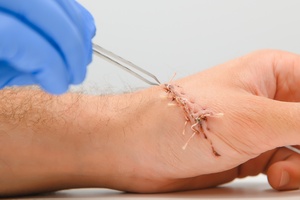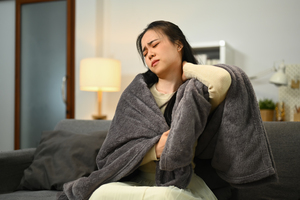Key points
- Food poisoning, caused by consuming contaminated food or drink, can lead to serious complications requiring medical attention.
- Most cases of food poisoning can be managed at home with proper hydration, rest, and careful reintroduction of bland foods.
- Severe symptoms like extreme thirst, dizziness, bloody vomit or stool, difficulty breathing, persistent vomiting or diarrhea, high fever, and severe weakness require immediate medical attention.
- Certain individuals, including young children, pregnant women, older adults, people with chronic illnesses, and those with weak immune systems, are more susceptible to severe food poisoning.
- Prevention of food poisoning involves safe food handling practices such as avoiding raw meat and eggs, refrigerating leftovers promptly, washing hands, using separate cutting boards, and being cautious with dairy products.

What Are Some Common Causes of Food Poisoning?
According to the Mayo Clinic, food poisoning, an illness caused by consuming contaminated food or drink, can be triggered by various pathogens such as bacteria, viruses, and parasites. The Mayo Clinic explains that these microorganisms can contaminate food at any point during its production, processing, or cooking.
Understanding the common culprits behind foodborne illness is crucial for prevention and safe food handling practices. Below are some of the most prevalent causes of food poisoning, according to the Mayo Clinic:
-
Listeria: Often found in unpasteurized dairy products, soft cheeses, and ready-to-eat deli meats, Listeria monocytogenes can thrive even in refrigerated temperatures, making it a persistent source of infection.
-
E. coli: This group of bacteria is commonly associated with undercooked beef, especially ground beef, as well as raw vegetables and unpasteurized milk and juices. Certain strains, such as E. coli O157:H7, can cause severe symptoms and complications.
-
Shigella: Typically spread through direct contact with the bacteria in stool, Shigella is often associated with contaminated water or food and can cause severe diarrhea and dysentery.
-
Cryptosporidium: This parasite is spread through water contaminated with feces. It can be found in swimming pools and can contaminate fresh produce and is known to cause cryptosporidiosis, leading to watery diarrhea.
-
Salmonella: Commonly linked with raw or undercooked eggs, poultry, and meat, as well as unpasteurized milk and juice, Salmonella bacteria are a frequent cause of foodborne illness.
-
Norovirus: Often referred to as the stomach flu, norovirus can spread quickly through contaminated food, water, surfaces, and close contact with infected individuals, leading to gastroenteritis.
-
Campylobacter: Usually found in raw or undercooked poultry, unpasteurized milk, and contaminated water, Campylobacter is one of the main causes of bacterial diarrhea worldwide.
How to Treat Food Poisoning at Home
When dealing with food poisoning, the body needs support to recover from the onslaught of harmful bacteria or viruses, according to Healthline. While most cases of food poisoning can be managed at home, they note that it's essential to understand the appropriate care techniques to alleviate symptoms and prevent dehydration, which can occur due to vomiting and diarrhea.
The following advice outlines steps you can take to treat food poisoning at home, helping to ease discomfort and facilitate recovery, according to the Mayo Clinic.
-
Stay Hydrated: Sip on water, clear broths, or electrolyte solutions regularly to replace fluids lost through vomiting and diarrhea. Avoid caffeine and alcohol, as they can lead to further dehydration.
-
Rest: Your body will need energy to fight off the infection, so ensure you get plenty of rest.
-
Ease Back Into Eating: Begin with bland, easy-to-digest foods like toast, rice, bananas, and applesauce. Avoid fatty, spicy, or dairy-rich foods until you feel better.
-
Avoid Certain Medications: While you might be tempted to use anti-diarrheal medications, these can slow down the elimination of toxins from your system. Only use these if recommended by a healthcare provider.
-
Practice Good Hygiene: Wash your hands thoroughly with soap and water, especially after using the bathroom and before handling food, to prevent the spread of infection.
-
Monitor Your Symptoms: Keep an eye on your symptoms. If they worsen or persist beyond a few days, seek medical attention.
Managing food poisoning at home is generally a matter of comfort and hydration. However, if symptoms are severe or do not improve, it may be necessary to seek medical care.
When Should You Go to the Hospital for Food Poisoning?
While most food poisoning cases can be treated at home, there are certain symptoms that signal the need for immediate medical attention, according to the Mayo Clinic. They explain that these symptoms may indicate a more severe infection or complications that could be life-threatening if not treated promptly. It's crucial to recognize these warning signs and understand when to seek help from healthcare professionals.
Here are symptoms that warrant a trip to the hospital, according to the Mayo Clinic:
-
Extreme Thirst and Dry Mouth: These are signs of severe dehydration, which can be a dangerous complication of food poisoning.
-
Dizziness and Confusion: Altered mental status or extreme weakness can indicate serious dehydration or other complications that require urgent medical care.
-
Bloody Vomit or Stool: The presence of blood in vomit or stool is a sign of severe gastrointestinal irritation or damage, which needs immediate medical evaluation.
-
Difficulty Breathing or Swallowing: These symptoms can be a sign of a severe allergic reaction or other serious conditions that can accompany certain types of food poisoning.
-
Persistent Vomiting and/or Diarrhea for More Than a Few Days: Prolonged symptoms increase the risk of dehydration and can indicate a more serious infection.
-
Fever Higher Than 101 Degrees Fahrenheit: A high fever may suggest a significant infection that could require antibiotics or other treatments.
-
Weakness: Severe weakness or muscle pain could be a sign that the infection is affecting more than just the digestive system.
-
Severe Dehydration: Symptoms of severe dehydration include very little or no urine, severe weakness, and dizziness. This condition is particularly dangerous and can be life-threatening if not treated promptly.
If you or someone you know is experiencing any of these symptoms, it's important to seek hospital care immediately to ensure proper treatment and recovery.
Who Should Go to the Hospital for Food Poisoning?
Certain individuals may be more vulnerable to the effects of food poisoning and should be particularly vigilant about when to seek hospital care. These high-risk groups can experience more severe symptoms and complications due to their age, underlying health conditions, or changes in their immune systems, according to the Mayo Clinic. They note that prompt medical attention for these populations is crucial to prevent serious health outcomes.
Here are specific groups of people who should especially consider going to the hospital for food poisoning symptoms, according to the Mayo Clinic:
-
Babies and Young Children: Their immune systems are not fully developed, and they can become dehydrated quickly.
-
Pregnant Women: Food poisoning can pose a risk to both the mother and the unborn baby, leading to complications such as premature delivery or severe infection.
-
Adults Over 60 Years Old: Older adults may have weakened immune systems and other health conditions that can exacerbate the effects of food poisoning.
-
People with Chronic Illnesses: Individuals with diseases such as diabetes, liver disease, or kidney disease may have less ability to fight off infections.
-
People with Weak Immune Systems: This includes those undergoing chemotherapy, taking immunosuppressive drugs, or living with HIV/AIDS, as their bodies are less equipped to handle infections.
If someone in these groups shows symptoms of food poisoning, it's particularly important to monitor their condition closely and seek medical attention if they exhibit any of the severe symptoms previously mentioned.
7 Ways to Avoid Food Poisoning
Preventing food poisoning is key to maintaining good health and avoiding the uncomfortable and potentially dangerous symptoms that come with it, according to the Mayo Clinic. They explain that by following certain safety practices in the kitchen and when choosing what to eat, you can significantly reduce the risk of ingesting harmful bacteria, viruses, or parasites.
Here are several effective ways to avoid food poisoning, ensuring that your meals are not only delicious but also safe to eat, according to the Mayo Clinic:
-
Avoid Eating Raw Meat: Ensure all meat is cooked to the appropriate internal temperature to kill any harmful organisms.
-
Refrigerate Leftovers Within Two Hours: Bacteria can multiply rapidly at room temperature, so promptly refrigerating cooked food can help prevent bacterial growth.
-
Avoid Raw Eggs: Consuming raw or undercooked eggs can expose you to Salmonella, so it's best to eat eggs that have been cooked until the yolks are firm.
-
Wash Your Hands and Disinfect Surfaces: Regular handwashing and cleaning of surfaces that come into contact with raw meat can prevent cross-contamination.
-
Avoid Raw Sprouts: Raw sprouts can harbor E. coli and Salmonella, so it's safer to eat them cooked.
-
Use Separate Cutting Boards: Use separate cutting boards for raw meat, poultry, and seafood to avoid cross-contamination with ready-to-eat foods.
-
Be Cautious with Dairy Products: Consume only pasteurized milk and cheese products to reduce the risk of exposure to bacteria like Listeria.
By incorporating these practices into your daily routine, you can greatly minimize the chances of experiencing food poisoning and keep your food safe for consumption.
Urgent care near me
Experiencing severe or prolonged food poisoning symptoms? Find an urgent care near you using Solv.
FAQs
What causes food poisoning?
Food poisoning is caused by consuming food or drink contaminated with pathogens such as bacteria, viruses, and parasites. These microorganisms can contaminate food at any point during its production, processing, or cooking.
How can I treat food poisoning at home?
At home, food poisoning can be managed by staying hydrated, resting, slowly reintroducing bland foods, avoiding certain medications, practicing good hygiene, and monitoring your symptoms.
When should I seek medical attention for food poisoning?
You should seek immediate medical attention if you experience severe symptoms like extreme thirst, dizziness, bloody vomit or stool, difficulty breathing, persistent vomiting or diarrhea, high fever, and severe weakness.
Who is more susceptible to severe food poisoning?
Young children, pregnant women, older adults, people with chronic illnesses, and those with weak immune systems are more susceptible to severe food poisoning and should seek medical attention promptly if they exhibit severe symptoms.
How can I prevent food poisoning?
Preventing food poisoning involves safe food handling practices like avoiding raw meat, promptly refrigerating leftovers, avoiding raw eggs, washing hands and disinfecting surfaces, avoiding raw sprouts, using separate cutting boards for raw meat, and being cautious with dairy products.











